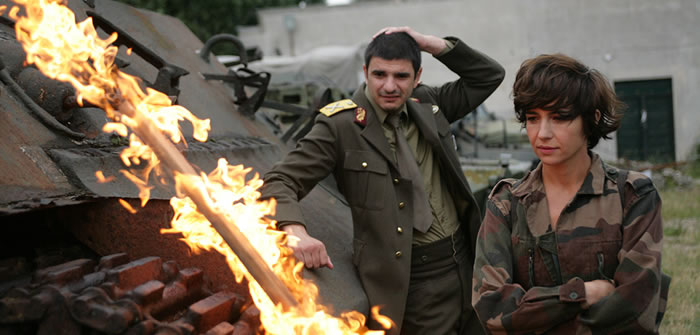“I do not care if we go down in history as barbarians.” These words, spoken in the Council of Ministers of the summer of 1941, started the ethnic cleansing on the Eastern Front and now its title of a new film by Radu Jude, the Romanian filmmaker. The amazing film with its rich satire and fresh look, attempts to comment on the above statement. “I do not care if we go down in history as barbarians.” Is Romania’s entry for the Best Foreign Language Film Award and we had a brief interview with Radu Jude. Radu does not believe that his film has a chance to be nominated for the Oscar, but if this does not happen, we blame it on Academy members taste of what is a good film!
Cinema Without Borders: I found “I Do Not Care If….” quite refreshing in its approach to deal with reality, how did you come up with this approach?
Radu Jude: By sheer necessity. I found it impossible to make a so-called historical film on this topic. And my idea was always that the film should also be about the representation, the representation of history, but not only that. That’s why I ended up with a collage more than a story.
CWB: “I Do Not Care If….” deals with issue of antisemitism in Romania, but I think it goes beyond that and is quite relevant to what happens in regard to racism in other parts of the world, do you agree with this?
RJ: Yes. As Johan Huizinga wrote, there is no need to make any historical work if it is not relevant for today.
CWB: Dealing with history and confronting it by audiences are always very challenging and uncomfortable, is that why you choose your fictional style to make this film?
RJ: No, it is more the theoretical problem of how one can make a film about history and from this appeared all the answers – the film is my answer to this question.
CWB: You present a very interesting visual style in “I Do Not Care If….”, how did you come up with this style? did you had it in your screenplay or more formed during the editing stage?
RJ: If you mean by that the fact that close to the end the shooting style of the film changes and becomes like a live TV broadcast, this has to do also with my desire of pointing to the viewers that anytime they see something regarding the past (and not only the past) it is always a reality constructed by somebody, using a specific medium. And I wanted to make this construction clear.
CWB: What has been the reaction of Romanian audience to the sensitive subject of your film?
RJ: As you can imagine, very split, it is not a popular topic. Some people attacked the film, especially the right-wing people, nationalists and so on. But there were also many who defended the film, I am very grateful to them.
CWB: How did you go about casting of “I Do Not Care If….”?
RJ: In a very traditional way – inviting actors to audition for the main part. For the others, I worked with actors I already worked with in the past.
CWB: How do you see the chances of “I Do Not Care If….” to get a nomination or winning the Oscar?
RJ: The chances for a nomination are 0.00%. The chances for winning are ten times more.

